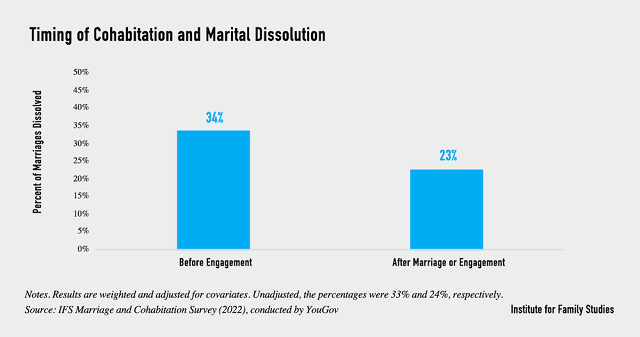Highlights
- The timing of moving in together is robustly associated with marital instability, per new IFS report. Post This
- Consistent with prior research, couples who cohabited before marriage were more likely to see their marriages end than those who did not. Post This
- Those who started cohabiting before being engaged were more likely to experience marital dissolution than those who only did so after being engaged or already being married. Post This
Editor's Note: The following essay is excerpted from the new Institute for Family Studies report, What's the Plan? Cohabitation, Engagement, and Divorce, by Scott Stanley and Galena Rhoades.
Fifty to 65% of Americans believe that living together before marriage will improve their odds of relationship success. Younger Americans are especially likely to believe in the beneficial effects of cohabitation, and to view living together as providing a valuable test of a relationship ahead of marriage. Yet living together before marriage has long been associated with a higher risk for divorce, contradicting the common belief that cohabitation will improve the odds of a marriage lasting.
This association between premarital cohabitation and divorce is often called the cohabitation effect. With 70% of couples living together before marriage, it is important to understand how and when cohabitation is associated with poorer odds of marital success.
Controversy over this topic has abounded, both in the media and in science journals, with some arguing that any association between premarital cohabitation and divorce is due to selection—that is, the association is merely related to differences in who does or does not live together before marriage—and others suggesting that something about the experience of living together makes a couple more likely to struggle in marriage. We believe both selection and experience are part of the explanation, and that there are steps people can take to increase their odds of having a lasting marriage based on how or if they cohabit before marriage.
Using a new national sample of Americans who married for the first time in the years 2010 to 2019, we examined the stability of these marriages as of 2022 based on whether or not, and when, people had lived together prior to marriage. Consistent with prior research, couples who cohabited before marriage were more likely to see their marriages end than those who did not cohabit before marriage. (See the report's sidebar.)
The primary finding of this report is that the timing of moving in together is robustly associated with marital instability.
- Those who started cohabiting before being engaged were more likely to experience marital dissolution than those who only did so after being engaged or already being married. Specifically, 34% of marriages ended among those who cohabited before being engaged, compared to 23% of marriages for those who lived together only after being either married or engaged to be married.
- In relative terms, the marriages of those who moved in together before being engaged were 48% more likely to end than the marriages of those who only cohabited after being engaged or already married.
Our findings suggest that one key to reducing the risk of divorce may be either not to cohabit before marriage or to have settled the big question about marital intentions before moving in together.

Key Takeaways
- Not living together before marriage, or only doing so after already being engaged to marry, is associated with a lower likelihood of marriages ending than living together before being engaged.
- Couples might lower their risks of divorce by having clear intentions to marry before moving in together or by waiting until marriage to live together.
- Reasons for moving in together also matter: People who reported that their top reason for moving in together was either to test the relationship or because it made sense financially were more likely to see their marriages end than those who did so because they wanted to spend more time with their partner.
- Having a greater number of prior cohabiting partners is associated with a higher likelihood of marriages ending.
- Talking about what living together means and making a decision together about it (rather than sliding into it) might help lower the risk of marital difficulties for some couples who will live together before marriage. Clarifying marital intentions may be a particularly important goal for such discussions.
Read more from the report here, or download the full report.










